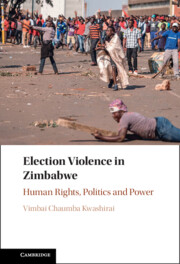Book contents
- Election Violence in Zimbabwe
- Election Violence in Zimbabwe
- Copyright page
- Dedication
- Contents
- Figures
- Tables
- Preface
- Acknowledgements
- Abbreviations
- Introduction
- 1 Violence, a Colonial Curse
- 2 Zanu PF and PF Zapu Violence
- 3 The New Enemy in the 1990 General Elections Was Zum
- 4 Zanu PF on Zanu PF Violence in 1995
- 5 What Presidential Election in 1996?
- 6 The Movement for Democratic Change Was Number One Enemy in 2000
- 7 Presidential Election in 2002
- 8 What General Elections in 2005?
- 9 Disharmony in the 2008 Harmonised Elections
- 10 Violence in the 2013 Elections
- Conclusions
- Recommendations
- Select References
- Index
1 - Violence, a Colonial Curse
The 1980 General Elections
Published online by Cambridge University Press: 23 February 2023
- Election Violence in Zimbabwe
- Election Violence in Zimbabwe
- Copyright page
- Dedication
- Contents
- Figures
- Tables
- Preface
- Acknowledgements
- Abbreviations
- Introduction
- 1 Violence, a Colonial Curse
- 2 Zanu PF and PF Zapu Violence
- 3 The New Enemy in the 1990 General Elections Was Zum
- 4 Zanu PF on Zanu PF Violence in 1995
- 5 What Presidential Election in 1996?
- 6 The Movement for Democratic Change Was Number One Enemy in 2000
- 7 Presidential Election in 2002
- 8 What General Elections in 2005?
- 9 Disharmony in the 2008 Harmonised Elections
- 10 Violence in the 2013 Elections
- Conclusions
- Recommendations
- Select References
- Index
Summary
The anti-colonial struggle staged in Zimbabwe against repressive British colonial rule depicted a liberation for equality, freedom and democracy. If Zimbabwe regularly held elections to choose alternative leaders from different political parties in different elections, allowing winners of a free and fair election to assume office; and in turn the winners of one election did not prevent the same competitive uncertainty from prevailing in the next election, the country would be democratic. However, there is no equivalence between elections and democracy. The minimalist conception of democracy is the indispensable institutional characteristic of electoral competition and its uncertainty. The maximalist notion requires extra-electoral imperatives for democracy to fully flourish, incorporating a wide range of types of institutions, processes and conditions to be present for a nation to be called a full democracy. Widespread election violence in 1980 dented Zimbabwe’s opportunity to develop ideal democratic cultures that embrace electoral democracy, government accountability and the rule of law. Post-war political, dissident and election violence proved to be Zimbabwe’s greatest political problem early on. Election and political violence, mhirizhonga or udlakela, largely amongst the Ndebele and Shona was a major concern characterised by intimidation, harassment, vandalism and murders.
- Type
- Chapter
- Information
- Election Violence in ZimbabweHuman Rights, Politics and Power, pp. 8 - 34Publisher: Cambridge University PressPrint publication year: 2023

